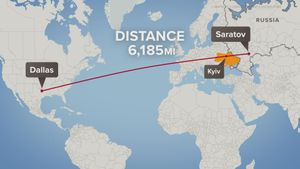Leaders from Mexico and Canada have announced temporary pauses on the 25% tariffs imposed by the United States, following high-stakes discussions with President Donald Trump aimed at addressing border security and drug trafficking concerns.
On Monday morning, Trump revealed on his social media platform, Truth Social, details of the agreement reached during what he described as "a very friendly conversation" with Mexican President Claudia Sheinbaum. The pause allows negotiations over the next month to continue without the looming threat of additional tariffs impacting economic relations. "We agreed to immediately pause the anticipated tariffs for a one month period," Trump affirmed.
Significantly, Mexico pledged to send 10,000 soldiers to its border to deter illegal immigration and curb the flow of fentanyl heading to the United States. Sheinbaum reiterated her country’s commitment, stating, "Mexico will immediately reinforce the northern border to prevent drug trafficking from Mexico to the United States, particularly fentanyl." The United States, for its part, agreed to work on measures to prevent high-powered weapons from entering Mexico, addressing one of the pressing issues driving violence linked to drug cartels.
Later the same day, Canadian Prime Minister Justin Trudeau made his own announcement on social media, confirming the pause on tariffs for Canadian imports for at least 30 days. His government is implementing its own $1.3 billion plan to bolster border enforcement, aimed at stanching the flow of fentanyl and other illicit drugs.
Pundits and business leaders praised the decisions, viewing them as necessary steps to maintain the stability of trade relations among the three North American nations. Mike Hubbard, Director of International Trade with the Economic Development Partnership of North Carolina (EDPNC), mentioned to ABC 11, "Hopefully they have an agreement very quickly. I think both sides want an agreement very quickly. It’s big, and it’s a lot." He highlighted the significant trade volume between North Carolina and Canada as well as Mexico, noting the potential damage uncertainty could cause to businesses.
Despite the positive news surrounding the tariff pauses, the threat of increased prices for consumer goods and potential economic turmoil remains. A previously planned tariff on Canadian energy products was also part of the impending measures, adding to fears of inflation and stalling economic growth. Scholar Scott Dyreng from Duke University’s Fuqua School of Business cautioned, "The reality is pretty simple economics. When the price of a part goes up, we have to charge more or else lose money." This sentiment is echoed across various sectors as businesses sought to adapt to rapidly changing circumstances.
Companies like Apex Instruments, represented by Miles Wright, are preparing for the possibility of sustained uncertainties. Wright explained their proactive approach: "We did some pre-buying to try to protect us... Today, we just decided to shorten our quotations to 30 days due to uncertainty around pricing." They face unique challenges as certain products are exclusively manufactured overseas, making it difficult to transition fully to domestic sourcing without incurring higher costs, should the tariffs remain.
The stock market has also reacted to these developments. After the announced pause on tariffs impacting Mexico, stocks fell but showed signs of recovery later as investors digest the possibilities of stabilized trade relations. This trading volatility particularly highlights market anxieties rooted in predictable trade outcomes and the importance of these negotiations moving forward.
Trump noted these agreements as political victories, alluding to their potential to bolster bilateral relations and trade ties. Technical negotiations are set to continue, led by key figures from his administration, including Secretary of Commerce Howard Lutnick and Secretary of State Marco Rubio, with the intent of developing comprehensive plans to sustainably address mutual concerns over drugs and security.
This situation is emblematic of Trump's broader economic strategy. While aiming to leverage tariffs to raise government revenue, he's simultaneously underplayed the risk of rising costs imposed on consumers. His approach has traditionally been touted as providing competitive advantages to American industries, but the actual outcomes, particularly for everyday Americans, remain contentious.
With discussions now at the forefront among these North American nations, it’s clear the coming weeks will be pivotal. The outcomes of these negotiations hold significant importance for trade relations going forward, signaling both stabilization and the potential for greater cooperation on shared challenges.
Overall, the temporary tariffs pause reflects the desire for continued dialogue and cooperation, striving for optimal solutions amid pressing issues affecting border security and drug flows between nations closely tied through trade.



